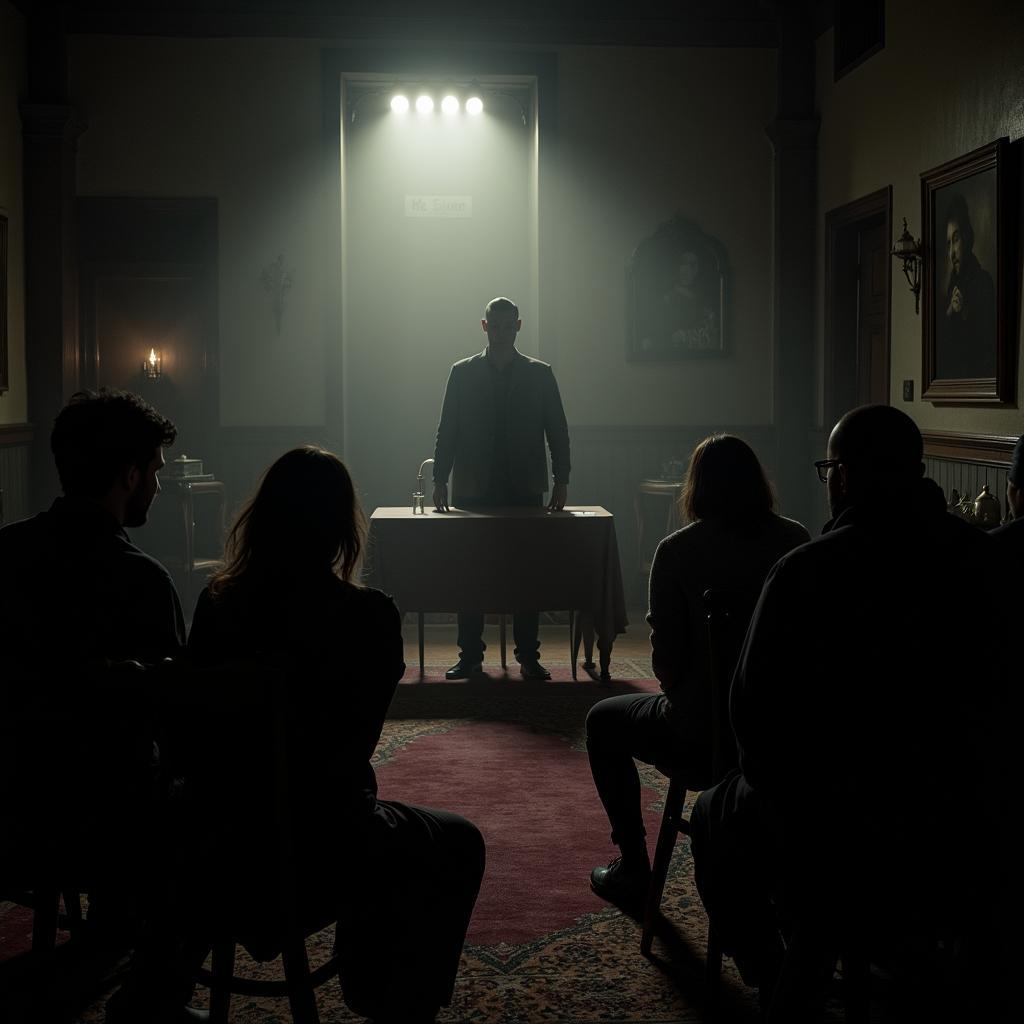A Research Confederate, a seemingly ordinary individual, plays a crucial role, often unseen, in shaping the outcomes of experiments, particularly within the realm of paranormal research. Their presence, though carefully concealed, adds a layer of complexity and control that can be instrumental in unveiling the truth behind unexplained phenomena.  A research confederate observing a medium during a seance.
A research confederate observing a medium during a seance.
What Exactly is a Research Confederate?
A research confederate is an individual who participates in a research study, but who is actually working for the researcher. They are instructed to act in a specific way, often without the other participants knowing their true role. This allows researchers to manipulate the social context, introduce specific variables, or test the reactions of genuine participants in a controlled environment. This technique is frequently used in psychology, sociology, and, increasingly, in paranormal research.
In paranormal investigations, a confederate in research can be used to create seemingly supernatural occurrences, test the sensitivity of equipment, or evaluate the biases of investigators. Their actions can range from subtly suggesting paranormal activity to outright faking phenomena. This allows researchers to examine how genuine participants respond to these staged events, providing valuable insights into the psychological and sociological factors influencing paranormal beliefs and experiences.
The Importance of Confederates in Paranormal Research
Utilizing a confederate provides a powerful tool for dissecting the complex interplay of suggestion, expectation, and perception in paranormal experiences. It allows researchers to test specific hypotheses and control for variables that are difficult to manage in natural settings. For example, a confederate might be used to:
- Test the accuracy of paranormal equipment: By having a confederate manipulate the environment in a controlled manner, researchers can determine if a device is genuinely detecting paranormal activity or simply responding to mundane stimuli.
- Investigate the impact of suggestion: A confederate can subtly suggest the presence of a ghost or other paranormal entity to see how this suggestion influences the perceptions and experiences of other participants. in psychological research a confederate is a key tool for exploring the power of suggestion.
- Examine the role of prior beliefs: By observing how individuals with varying levels of belief in the paranormal react to a staged event, researchers can gain a better understanding of how prior beliefs shape our interpretations of ambiguous experiences.
Ethical Considerations in Using Research Confederates
The use of confederates in any research, especially paranormal investigations, raises important ethical considerations. is deception allowed in psychological research is a complex question that is also relevant to paranormal research. Deception is often necessary to maintain the integrity of the experiment, but it must be carefully balanced against the need for informed consent and participant well-being. Researchers must ensure that participants are fully debriefed after the study and that any potential psychological harm is minimized.
“Transparency and ethical practices are paramount when using confederates in paranormal research,” explains Dr. Emily Carter, a leading researcher in anomalous psychology. “While deception can be a powerful tool, it must be used responsibly and with careful consideration for the participants involved.”
Beyond Confederates: Other Research Methods in Paranormal Investigations
While confederates offer a unique perspective, they are not the only tool used in paranormal research. Other methods, like vignettes in research, can be valuable in exploring people’s experiences and beliefs without staged events. Researchers also employ rigorous methodologies, including statistical analysis, controlled experiments, and field observations, to gather and analyze data related to paranormal phenomena.
“Combining diverse methodologies, including the ethical use of confederates, allows us to approach the study of paranormal phenomena with a more comprehensive and nuanced perspective,” notes Professor Alexander Blackwood, a renowned paranormal investigator.
In conclusion, the research confederate, when employed ethically and judiciously, becomes an invaluable tool in the ongoing quest to understand the mysteries of the paranormal. By carefully manipulating variables and observing participant responses, researchers can gain crucial insights into the psychological and social dynamics at play in paranormal experiences. This careful approach allows us to move beyond mere speculation and towards a more scientific and informed understanding of the unexplained.
FAQs
- What is the primary purpose of using a research confederate?
- Are there ethical concerns related to using research confederates?
- How can the use of a confederate impact the validity of paranormal research?
- What are some alternatives to using confederates in paranormal investigations?
- How can researchers ensure ethical practices when using deception in paranormal research?
- Can you provide examples of how confederates have been used in specific paranormal studies?
- What are the potential psychological impacts on participants who unknowingly interact with confederates in paranormal research?
Need help with your Paranormal Research? Contact us at Phone: 0904826292, Email: research@gmail.com or visit us at No. 31, Alley 142/7, P. Phú Viên, Bồ Đề, Long Biên, Hà Nội, Việt Nam. Our team is available 24/7.